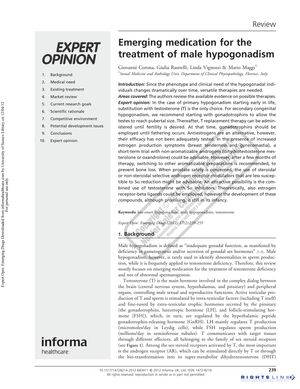Emerging Medication for the Treatment of Male Hypogonadism
May 2012
in “
Expert Opinion on Emerging Drugs
”
testosterone replacement therapy TRT gonadotrophins antiestrogens non-aromatizable androgens human chorionic gonadotrophin hCG late-onset hypogonadism LOH dutasteride testosterone gel dihydrotestosterone gel DHT gel mesterolone selective estrogen receptor beta ligands ERß ligands selective androgen receptor modulators SARMs AUS-131 GTx-024 testosterone therapy

TLDR New treatments for male hypogonadism are effective and should be personalized.
The document from May 21, 2012, provides an overview of emerging treatments for male hypogonadism, emphasizing the importance of testosterone replacement therapy (TRT) and its market potential. It discusses various treatment strategies based on the type of hypogonadism and the patient's age, including the use of gonadotrophins, antiestrogens, and non-aromatizable androgens. The document cites several studies, including an RCT by Liu et al. (2002) with 40 men and another by Tsujimura et al. with 21 patients, showing the effectiveness of human chorionic gonadotrophin (hCG) for late-onset hypogonadism (LOH). Another RCT by Page et al. with 53 men demonstrated the benefits of combining dutasteride and testosterone gel in reducing prostate volume and serum PSA levels. The document also reviews the effects of dihydrotestosterone (DHT) gel, mesterolone, and antiestrogens on sexual function, muscle strength, and testosterone levels, with varying results across different studies. It highlights the potential of selective estrogen receptor beta (ERß) ligands and selective androgen receptor modulators (SARMs) for tissue-specific treatment, referencing clinical trials for compounds like AUS-131 and GTx-024. The document concludes that while there is no universal therapy for male hypogonadism, a variety of treatment options are available and should be tailored to individual needs.








